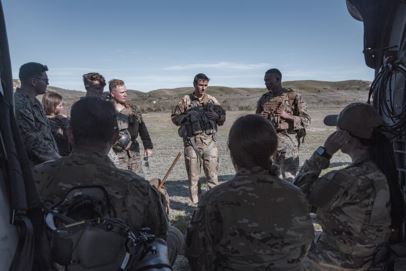By Dr. Kate McGraw
Aug. 3, 2022

U.S. Marine Corps photo by Cpl. Mackenzie Binion
Have you ever been deliberately excluded from a social group or witnessed someone else being left out from group fun on purpose? Chances are most of us have experienced this and know firsthand how painful it can be. Did you know that ostracism is the act of intentionally excluding another from an activity or interaction, and the impact of ostracism on mental health has lasting and detrimental effect?
Social connectedness is known to be protective to mental health and quality of life, and unwelcome social isolation can often be a risk factor for development of depression, anxiety, and other mental health challenges. A growing body of evidence in this young area of exploration shows that the individual being ostracized, those ostracizing the targeted person, and those that witness the ostracism all experience negative impact3,5,8.
This area of research, especially as it relates to the military, is in the early stages and the literature is not yet robust. My interest in this area led to a publication in Military Medicine where I attempted to integrate relevant studies from separate but related disciplines in pain, social support, ostracism and gender, to explore links and develop a potential theory of ostracism's impact on mental health in the military4. A team of researchers subsequently tested my ideas with a veteran population who deployed, and found that perceived ostracism correlated with psychological problems and appeared to explain additional variance in PTSD symptoms beyond predictors previously and more typically used (i.e., deployment stress, perceived military and civilian-based social support). They further found ostracism to be the most important predictor of PTSD symptoms in a relative weights analysis7. More recent study results indicate life appears to lack meaning without acceptance from others, and the experience of ostracism seems to increase the likelihood of suicidal thoughts1, ostracism appears to mediate suicidal ideation and insomnia2, and ostracized individuals appear more likely to endorse conspiracy beliefs related to different political issues6. Clearly the power of belonging has tremendous influence on our ability individually and as a team to successfully execute our military mission, and to enjoy a high quality life. The Department of Defense is currently funding a research study on this topic in order to develop and study strategies to reduce ostracism in the military.
What can you do to reduce ostracism around you? Share this information with your teammates. Stop ostracism when you see it about to happen, and speak up before it happens. Go out of your way to include individuals who appear marginalized by others. Strengthen the cohesion of your team by encouraging, supporting and including all team members to participate in unit events and activities.
If you or someone you know is in crisis, having thoughts of harm to self or others, or need additional mental health support, the new help line number is 988; someone is standing by to listen and help you.
References
- Chen Z, Poon K-T, DeWall C N, Jiang T. (2020): Life lacks meaning without acceptance: Ostracism triggers suicidal thoughts. J Pers Soc Psychol. 1423-1443.https://psycnet.apa.org/record/2020-15000-001
- Chu C, Buchman-Schmitt JM, Stanley IH, Hom MA, Tucker RP, Hagan CR, Rogers ML, Podlogar MC, Chiurliza B, Ringer FB, Michaels MS, Patros CHG, Joiner TE. The interpersonal theory of suicide: A systematic review and meta-analysis of a decade of cross-national research. Psychol Bulletin 2017 Dec;143(12). https://pubmed.ncbi.nlm.nih.gov/29072480/
- Ferris, L. J., Jetten, J., Hornsey, M. J., & Bastian, B. (2019). Feeling hurt: Revisiting the relationship between social and physical pain. Review of General Psychology, 23(3), 320–335._https://doi.org/10.1177/1089268019857936
- McGraw, K. PhD, Gender Differences Among Military Combatants: Does Social Support, Ostracism, and Pain Perception Influence Psychological Health?, Military Medicine, Volume 181, Issue suppl_1, Jan. 2016, Pages 80–85, https://doi.org/10.7205/MILMED-D-15-00254
- Paolini, D., Pagliaro, S., Alparone, F. R., Marotta, F., & van Beest, I. (2017). On vicarious ostracism. Examining the mediators of observers’ reactions towards the target and the sources of ostracism. Social Influence, 12(4), 117–127. https://doi.org/10.1080/15534510.2017.1377107
- Poon KT, Chen Z, Wong WY. Beliefs in Conspiracy Theories Following Ostracism. Pers Soc Psychol Bull. 2020 Aug;46(8):1234-1246. https://pubmed.ncbi.nlm.nih.gov/31928312/
- Wesselmann ED, Ispas D, Olson MD, Swerdlik ME, Caudle NM. Does perceived ostracism contribute to mental health concerns among veterans who have been deployed? PLoS One. 2018 Dec 6;13(12). https://journals.plos.org/plosone/article?id=10.1371/journal.pone.0208438
- Wesselmann ED, Williams KD (2013), Hales AH. Vicarious ostracism. Front Hum Neurosci. 2013 Apr 23;7:153. https://pubmed.ncbi.nlm.nih.gov/23630484/
Dr. Kate McGraw is Chief, Psychological Health Center of Excellence. A former USAF missile officer, her work as a DOD clinical psychologist in uniform and as a civilian for DOD has furthered research, clinical practice, programs, and policy in the areas of women's mental health, ostracism, implementation science, sexual assault suicide prevention, and sleep.